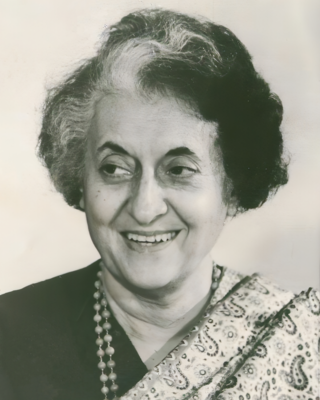
Indira Priyadarshini Gandhi was an Indian politician and stateswoman who served as the Prime Minister of India from 1966 to 1977 and again from 1980 until her assassination in 1984. She was India's first and, to date, only female prime minister, and a central figure in Indian politics as the leader of the Indian National Congress (INC). She was the daughter of Jawaharlal Nehru, the first prime minister of India, and the mother of Rajiv Gandhi, who succeeded her in office as the country's sixth prime minister. Gandhi's cumulative tenure of 15 years and 350 days makes her the second-longest-serving Indian prime minister after her father. Henry Kissinger described her as an "Iron Lady", a nickname that became associated with her tough personality.

The prime minister of India is the head of government of the Republic of India. Executive authority is vested in the prime minister and his chosen Council of Ministers, despite the president of India being the nominal head of the executive. The prime minister has to be a member of one of the houses of bicameral Parliament of India, alongside heading the respective house. The prime minister and his cabinet are at all times responsible to the Lok Sabha.

Rajiv Gandhi was an Indian politician who was the prime minister of India from 1984 to 1989. He took office after the assassination of his mother, then–prime minister Indira Gandhi, to become at the age of 40 the youngest Indian prime minister. He served until his defeat at the 1989 election, and then became Leader of the Opposition, Lok Sabha, resigning in December 1990, six months before his own assassination.

Sonia Gandhi is an Indian politician. She is the longest-serving president of the Indian National Congress, a social democratic political party, which has governed India for most of its post-independence history. She took over as the party leader in 1998, seven years after the assassination of Rajiv Gandhi, her husband and a former Prime Minister of India, and remained in office until 2017 after serving for twenty-two years. She returned to the post in 2019 and remained the President for another three years.
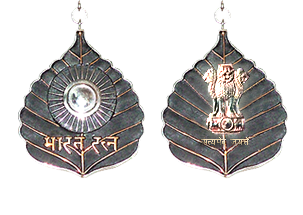
The Bharat Ratna is the highest civilian award of the Republic of India. Instituted on 2 January 1954, the award is conferred in recognition of "exceptional service/performance of the highest order", without distinction of race, occupation, position or gender. The award was originally limited to achievements in the arts, literature, science, and public services, but the Government of India expanded the criteria to include "any field of human endeavor" in December 2011. The recommendations for the award are made by the Prime Minister to the President. The recipients receive a Sanad (certificate) signed by the President and a peepal leaf-shaped medallion. Bharat Ratna recipients rank seventh in the Indian order of precedence.

Morarji Ranchhodji Desai was an Indian independence activist and politician who served as the Prime Minister of India between 1977 and 1979 leading the government formed by the Janata Party. During his long career in politics, he held many important posts in government such as Chief Minister of Bombay State, Home Minister, Finance Minister and 2nd Deputy Prime Minister of India.
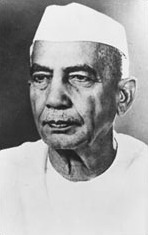
Chaudhary Charan Singh, better known as Charan Singh was an Indian politician and a freedom fighter. Singh was principally known for his land and agricultural reform initiatives. He briefly served as the prime minister of India from July 1979 to August 1979 and was Member of Parliament (MP) for Baghpat. During prime ministership he was a member of the Janata Party (Secular). He served as 5th Chief Minister of Uttar Pradesh as a member of Bhartiya Kranti Dal. He also briefly served as deputy prime minister of India from January 1979 to July 1979 as a member of the Janata Party. Singh is widely regarded as the "Champion of Farmers", after his life has been dedicated to advocating for the wellbeing and rights of farmers.
Events in the year 1984 in the Republic of India.
Events in the year 1975 in the Republic of India.
Events in the year 1977 in the Republic of India.

The Janata Party is an unrecognised political party in India. It was founded as an amalgam of Indian political parties opposed to the Emergency that was imposed between 1975 and 1977 by Prime Minister Indira Gandhi of the Indian National Congress. In the 1977 general election, the party defeated the Congress and Janata leader Morarji Desai became the first non-Congress prime minister in independent modern India's history.

Sanjay Gandhi was an Indian politician. He was a member of the Lok Sabha and was the younger son of Indira Gandhi and Feroze Gandhi.

Neelam Sanjiva Reddy was an Indian politician who served as the sixth president of India, serving from 1977 to 1982. Beginning a long political career with the Indian National Congress Party in the independence movement, he went on to hold several key offices in independent India – as Deputy Chief minister of Andhra state and the first chief minister of Andhra Pradesh, a two-time Speaker of the Lok Sabha and a Union Minister— before becoming the Indian president.
Events in the year 1976 in the Republic of India.

The Emergency in India was a 21-month period from 1975 to 1977 when Prime Minister Indira Gandhi declared a state of emergency across the country by citing internal and external threats to the country.
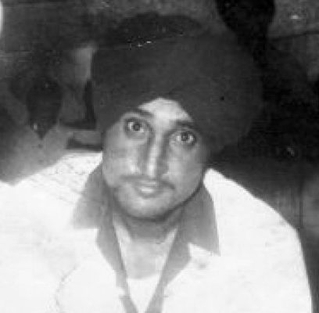
Satwant Singh was one of the bodyguards, along with Beant Singh, who assassinated the Prime Minister of India, Indira Gandhi, at her New Delhi residence on 31 October 1984. His attacks were in retaliation of Indira Gandhi's Operation Blue Star.

General elections were held in India on 22 and 26 November 1989 to elect the members of the ninth Lok Sabha. The incumbent Indian National Congress (Indira) government under the premiership of Rajiv Gandhi lost its mandate, even though it was still the largest single party in the Lok Sabha. V. P. Singh, the leader of the second largest party Janata Dal was invited by the President of India to form the government. The government was formed with outside support from the Bharatiya Janata Party and Communist parties led by CPI(M). V. P. Singh was sworn in as the seventh Prime Minister of India on 2 December 1989.
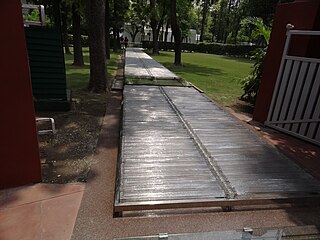
Indian prime minister Indira Gandhi was assassinated at 9:30 AM on 31 October 1984 at her residence in Safdarjung Road, New Delhi. She was killed by her Sikh bodyguards, Satwant Singh and Beant Singh, in the aftermath of Operation Blue Star by the Indian Army between 1 and 8 June 1984 on the orders of Gandhi. The military operation was to remove Sikh militant Jarnail Singh Bhindranwale and other Sikh separatists from the Golden Temple of Harmandir Sahib in Amritsar, Punjab, the holiest site of Sikhism. The military action resulted in the death of many pilgrims as well as damage to the Akal Takht and the destruction of the Sikh Reference Library.

Cuba–India relations are the bilateral ties between the Republic of Cuba and the Republic of India. The two countries share a warm and close relationship marked by mutual respect, solidarity and cooperation.

Pradhanmantri is an Indian television political documentary series, hosted by actor-director Shekhar Kapur on Hindi news channel ABP News. It premiered on 13 July 2013. It aimed to bring to the audience never-seen-before facts of Indian history. The weekly programme chronicles the history of India from 1947 to the present day. The TV series was hosted by the renowned film-maker, actor and host Shekhar Kapur and directed by Puneet Sharma. It was a unique attempt to present the changes in the country during the tenures of 13 prime ministers in the last 65 years. Pradhanmantri aired every Saturday at 10 pm. Raghi Papiya Joshi and Sohan Thakur are casting directors.















